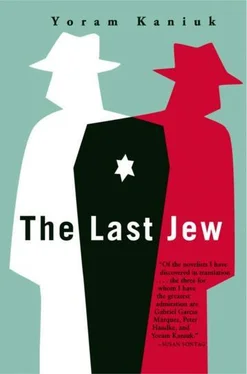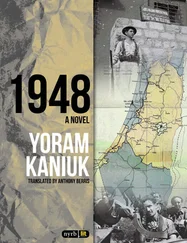And then my neighbor bent over and I heard a click, as if something that had been glued was freed.
We shut off the faucets. Darkness fell. You could have not died, I said in my heart to Menahem. Soon I'll go to Singer's store, as if years hadn't passed, as if my new neighbor didn't exist, I'll buy margarine, white bread, eggs, herring, and Mr. Giladi will be there with the smile full of a national secret on his face. And Singer will say to me: How are you today, Mr. Henkin, and I'll tell him everything's fine, Mr. Singer, oh these long summers…
My neighbor who remained mute and indifferent looked at me, I averted my face and went in my house, there wasn't even any point parting properly. My wife was standing in the kitchen washing dishes, she said, You stroked your little garden, Henkin? I told her, Don't start with me, Hasha, and she said, Masha, and I said to her, Hasha Masha. When we met on the road from Tiberias to Tsemakh her name was Masha, later on her friend Sarakh changed her name to Hasha. Now when I call her Hasha she says Masha, and when I call her Masha she says Hasha, so I call her Hasha Masha. You've got to know when to get into the grave and shut your eyes, she said, you're hurt, Henkin, what happened to you?
The neighbor asked about Boaz, and I told her what had happened.
She looked at me and smiled. I saw her appraising through me the lost character of Boaz Schneerson. I showered, put on my clothes, and stood there holding a cup of tea. I looked at the miracle of nature (as Noga put it) that was Hasha Masha, torments created some absolute unchanging in her. And once again a corrupt lust for her rose in me, a lust that at my age I was supposed to be weaned from, the teachers' organization had recently sent me for a routine examination and the doctor who was surely much younger than Menahem could have been gave me a thorough examination, put me on a stationary bike, measured blood pressure, blood, urine, heart, what-all, and then he said to me: You're in good shape, Henkin (as if he were talking about a used car), your arteries are the arteries of a forty-yearold, and I never heard about arterial stirrings but Hasha Masha evoked stirrings in me, arterial or not, I want her and every night she groans in the next bed, and I can't touch, and what should I do? Go look for some widow who'll have to get used to me and I to her? I could love only once in my life, give birth to one son, changing wasn't possible anymore.
I called the Shimonis and said I was sick and couldn't come this evening. My voice shook when I lied. My wife was putting up water and making more tea, the Shimonis said: No, out of the question. They spoke from both of their telephone extensions, from two rooms, as they usually did, they said: You've got to come, Henkin, he asked, and today he called again and asked to meet you. I told them I didn't understand why, I didn't know him, but they swore to me that he asked especially that I come and it was important and I mustn't dare not come, they said partly as a joke, partly as a hidden threat I had to discern. Hasha Masha is listening, smiling; I get dressed, a mildewed chill and a stifling of words on her lips she sits.
I came to the Committee of Bereaved Parents by chance, like all the things that had happened since my son fell. It was years ago. The garden was already destroyed, the house was wrapped in grief, the bonds between us and old friends were cut, I'd walk on Ben-Yehuda Street every morning, seeking, I'd teach, my heart wasn't in it. I'd be invited to circumcisions and weddings and I didn't go, I began wandering around aimlessly, and in an indifferent and alien human sea, I came on people whose eyes were perplexed and caught in my eyes, I sensed them, they sensed me, eyes staring, seeking something that wasn't there, vague, protected yet defeated looks, a gloomy pride of the vanquished, I smelled them and they smelled me, pain touched and engendered partnership, some necessary hold, I don't remember anymore exactly how it happened, maybe at the zoo where each of us separately used to take our dead sons to see the sights of their childhood. People feeding pigeons and pigeons flying calmly, feeling one another, and here's closeness, I had a son, we had, somebody comes to me in the street, carrying a briefcase, in it newspaper clippings his son had cut out for three years, surely there was some purpose in that cutting out, some goal, and what do you do with that, and the two notebooks he left behind and will the newspaper clippings explain my son to me, are they evidence he'll show to strangers, and who are the strangers, us, and so we started gathering not out of excessive love, not because of a common past, what remained between us was the heavy hatred of solitude, there was a need, maybe stupid but sunk inside us to introduce our sons to one another, each of us was amazed at the edge of his companion's pain, on buses, in parks, on streets, in cafes, stone butterflies trying to hunt their own shadow on the edge of the sidewalk, boasting of wings that became our dead sons, maybe that was an organized revolt against the life that gushed up around us, the new state, the national excitement, we wanted to be protected, together we could find the code words of our yearnings.
Hasha Masha didn't need any proof, she always had our son, not for one minute was he not with her, or more precisely, in her, she could long for him and not for somebody like herself. For her he wouldn't exist in conversations about him or in a reconstruction of the battles he took part in or measuring the road he took to the seashore in the morning, he was buried in her kitchen exactly as he was buried in the cemetery at Kiryat Anavim, he once lived so he's always alive, he once died, so he's always dead, she didn't need to translate him into something else as I did. If she wanted to, she could have known exactly how far he didn't grow. She didn't wait for his death to grant her life.
She seldom came to our Committee and later she no longer came even to important meetings. After years of chance encounters and tours to battlefields, the Committee turned into a fact, and I put my heart and soul into the activity of the Committee. The Shimonis made their house a regular meeting place that was quite convenient for all of us.
The meeting with Germanwriter wasn't something I longed for. The chairmanship of our Committee was ostensibly a technical matter, but I was the only one who always came by himself, and maybe the people sensed I was lonely not only for my son and aside from that I was an experienced teacher and even a school principal for a while, I knew quite a bit about printing and formulation, and anybody who wanted to publish a booklet in memory of his son could come to me and I knew what to advise him, close work relations were created between me and Jordana of the Commemoration Department, a harmonic system woven between us that considerably influenced the parents who joined us after Sinai and the SixDay War and those who fell between the wars who were mostly attacked in some national corner that can't be pinned down precisely, and now I had to come because Germanwriter asked explicitly for me and the Shimonis explained to me that the German was a member of some committee of noble-minded Germans, who cooperated with our committees all over Israel and there was already a thread of a Committee of International Friends, and the group of fifty from England, survivors of Buchenwald, through the German group subsidized a splendid booklet marking twenty years of the liberation of the camp and the slaughter of those survivors in the Land of Israel. An American group got a grant from them to plant a forest in the mountains of the Galilee not far from where the Shimonis' son fell and echoes of our sons found a response in various lands, international meetings were even held in Switzerland, England, Denmark, the United States, but I don't go to them since, on the day I ascended to the Land, in the month of Nisan nineteen twenty-one, I swore I would never leave this land and I intend never to break my vow, but the meetings take place and I prepare the material, write, correspond, attach photos, edit, and the German committee of which Germanwriter is a distinguished member financed quite a few commemoration activities and therefore I'm obliged to meet that noble-minded man and I can't, something mocks me, my neighbor with his requests, my conscience. My poor dear, says my wife contemptuously, it's really hard for Henkin to meet the international glory of his son, the representatives of the Foreign Ministry of the power of death, why don't you go, Obadiah?
Читать дальше












